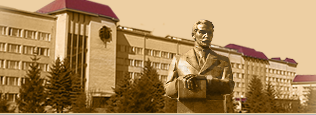ANALYSIS THE HISTORY DEVELOPMENT OF DEFINITIONS «RECREATION” AND “TOURISM”
A lot of scientific papers are devoted to the determination of the essence of definitions in recreational and tourist activities, but there is still a terminological problem of the correlation between the definitions of “tourism” and “recreation”, which scientists have been trying to solve for several decades to separate these concepts. For the complex characteristics of recreation and tourism the term “recreation” was adopted, which began to be currently used by other specialists, too. “Recreation” was defined as rest, recovering of vital energy spent in the labour process. Since the beginning of extension of recreational geography, the concepts of “recreation” and “rest” have been separated. Rest is part of the free time associated with recovering of vital energy in the territory of permanent residence. Recreation is part of the free time associated with recovering of vital energy in specialized areas. The concept of “recreation” is better suited to the tasks of empirical and applied studies, while “rest” is more convenient to use as a fundamental concept in the same row with the category of “work”. Understanding of the word “recreation” abroad is different. In English tourism literature, recreation refers to a set of phenomena and processes associated recovering of vital energy in the process of rest and treatment. In the West, the study of recreation developed independently from the studies of tourism. Tourism was seen as a commercial economic activity based on private capital and management, while recreation and parks were studied as a resource of national use and distribution. Therefore, the study of recreation focused on the public sector. The problems of managing pristine nature, non-market evaluation and analysis of recreational experience were studied. The study of tourism was more applied in nature, focusing on the traditional private sector (for example, the tourism industry). The models of travels, tourism demand, advertising and marketing were explored. In recent decades there has been intense commercialization in the field of recreational activities. This process is accompanied by the introduction of Western technologies and the introduction of new terminology in the recreational activities, mainly English. Tourism is economic in nature, and recreation is social. And the question of their volumetric correlation is not entirely correct due to the fact that tourism includes activities outside the recreation. At the same time, recreation includes a number of activities that are not tourism by nature. Borrowing of foreign terminology without taking into account the established conceptual apparatus within the framework of domestic science and practice leads, firstly, to philological paradoxes, and secondly, confuses the presentation of the material because of semantic contradictions. Further systematization, clarification and regulatory approval of the terminological apparatus of recreational geography and solving the problem of the inclusion or separation of the concept of “tourism” into a separate field are required.
Keywords: recreation, tourism, leisure, definition.
References:
- Pro zatverdzhennya Polozhennya pro rekreatsiynu diyal’nist’ u mezhakh terytoriy ta ob”yektiv pryrodno – zapovidnoho fondu Ukrayiny: Nakaz № 330 22.06.2009 / Zareyestrovano v Ministerstvi yustytsiyi Ukrayiny 22 lypnya 2009 r.za № 679/16695.
- Bevz H. M. Orhanizatsiya rekreatsiynykh zakhodiv u systemi sotsial’noyi roboty / Bevz H. M., Herasym H. Z., Kashuba Ya. M.: Navch. Pos. – L’viv: PAIS, 2006. – 132 s.
- Berezhna I.V. Natsional’ni priorytety ta rehional’ni determinanty sotsial’no-ekonomichnoho zrostannya (na materialakh AR Krym).- NAN Ukrayiny. Instytut rehional’nykh doslidzhen’, 2004.- 640 s.
- Haman P. I. Formuvannya mis’koho rekreatsiyno-kurortnoho i turystychnoho hospodarstva / P. I Haman. – Upravlinnya suchasnym mistom. – 2004. – № 2. – 242 s.
- Geografija turizma: [Uchebnik / pod red. A.Ju. Aleksandrovoj.] – M.: KNORUS, 2008. – 592 s.
- Dolzhenko G.P., Dolzhenko E.G. Razvitie nauchnyh issledovanij turistskoj dejatel’nosti v Rossii (1930 – 2010 gg.): Jelektronnoe uchebnoe posobie. Svidetel’stvo o registracii jelektronnogo resursa № 15890. 2010. – [Jelektronnyj resurs]. – Rezhim dostupa: http://www.gennadiy-dolzhenko.ru/a28.html
- Jelektronnye slovari russkogo izdanija. – [Jelektronnyj resurs]. – Rezhim dostupa: http://slovari.yandex.ru/.
- Kyfyak V.F. Sfera rekreatsiyi ta turyzmu yak skladova rehional’noyi ekonomichnoyi systemy // Formuvannya rynkovykh vidnosyn v Ukrayini. – 2006. – №1. – S. 116-119.
- Kuskov A. S. Rekreacionnaja geografija /A. S.Kuskov, V. L. Golubeva, T. N. Odincova. – Uchebno – metodicheskoe posobie. – [Jelektronnyj resurs]. – Rezhim dostupa: http://revolution.allbest.ru/geography/00012713_0.html . A. S.
- Mazhar L. Ju. Territorial’nye turistsko – rekreacionnye sistemy: geosistemnyj podhod k formirovaniju i razvitiju: avtoref. diss. … na soiskanie uchen. stepeni doktora geogr. nauk: spec. 25.00.24 «Jekonomicheskaja, social’naja i politicheskaja geografija» Sankt – Peterburg, 2009. – 31 s.
- Mamutov V. K. Rekreacija / V. K. Mamutov, O. І. Amosha, T. M. Dement’eva [i dr.]. Social’no-jekonomicheskie i pravovye aspekty. – Kiev: NAN Ukrainy. – K.: «Naukova dumka», 1992. – 141 s.
- Marmul’ L.O. Orhanizatsiyno-ekonomichny mekhanizm funktsionuvannya turystychno-rekreatsiynykh pidpryyemstv / L. O. Marmul’, O. A. Sarapina: [monohrafiya]. – K.: NNTs IAE, 2006. – 182 s.
- Stafiychuk I. V. Rekrealohiya / I. V. Stafiychuk: navch.pos. – K.: Al’tpres. – 2006. – 264 s.
- Teoreticheskie osnovy rekreacionnoj geografii. M.: Nauka, 1975. – 245 s.
